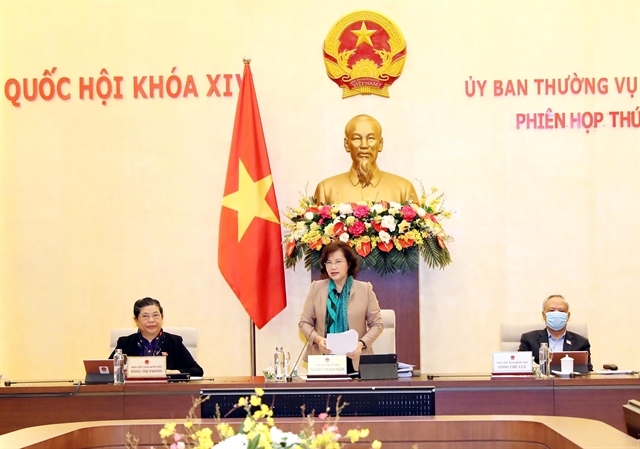 |
|
NA chairwoman Nguyễn Thị Kim Ngân (centre) delivered a speech at the 43rd session of National Assembly Standing Committee. |
Vũ Hồng Thanh, head of NA’s Economic Committee, said many deputies proposed the service shouldn’t be prohibited as it was an important market issue.
However, they said it is necessary to tighten business conditions and strengthen mediation organisations at all levels to avoid an increase in social problems.
The majority of NA’s Economic Committee Standing deputies agreed with the proposal.
They said that hiring an agency to act as a middleman was necessary, as long as companies worked within state regulations.
Lawmakers pointed out a lack of clear regulations had led to a number of violations in the past.
NA chairwoman Nguyễn Thị Kim Ngân shared the same opinion, stating that debt collection service was part of everyday life.
She blamed wrong-doings on the fact that State management had not properly implemented business conditions and there were few strict regulations.
But not everyone was in agreement. Thanh said some deputies want the service banned altogether.
The feel there are unscrupulous firms operating, who prey on people’s circumstances and use force to collect money, with loans being offered at high-interest rates.
NA deputy chairman Uông Chu Lưu agreed, saying that the debt collection service should be prohibited as it was stated in the draft revised law because the relationship between lenders and borrowers is a civil matter.
The State has a complete system of laws, management agencies and institutions to ensure the enforcement and protection of rights and obligations of the parties in civil relations and social relations must be governed by law, he said.
“Why we have to use a middleman acting as debt collection to settle civil relations when institutions which are available like arbitration, courts and mediations?” Lưu said.
The Revised Law on Enterprises also discussed by NA deputies on Monday, Thanh said.
He said the NA Economic Committee Standing deputies agreed with the proposal of not adding regulations of household businesses to the revised law.
It was necessary to have a separate law as household businesses were different from private enterprises, limited or joint-stock companies.
As the number of household businesses is quite large (more than 5.1 million), a thorough study and assessment should be made to complete the law.
Vũ Tiến Lộc, chairman of Việt Nam Chamber of Commerce and Industry said regulations of household business needed to be added to the revised law.
Concluding the session, NA deputy chairman Phùng Quốc Hiển said the NA Standing Committee agreed on devising a law to create a legal foundation for household businesses. The proposal will be submitted to the NA deputies for discussion, he said.
Fighting against COVID-19
The NA Standing Committee opened on Monday morning under the management of NA chairwoman Nguyễn Thi Kim Ngân.
Ngân appreciated the Government’s efforts and determination fight the spread of coronavirus.
The chairwoman also thanked doctors, medical staff and soldiers and all those who have contributed to the fight against the novel coronavirus (COVID-19) pandemic.
“The NA Standing Committee always stands shoulder to shoulder and ready to create favourable conditions for the government to implement prevention and combating measures,” she said.
“It demonstrates the solidarity between the army and the people as well as the responsibility of the whole political system.”
Deputy Prime Minister Vũ Đức Đam, head of the national steering committee on COVID-19 prevention, said the disease was being dealt with thanks to strict implementation of instructions by the Politburo, the Government and the Prime Minister.
However, he said, challenges lied ahead.
He emphasised the need to strengthen coordination between agencies and the application of information technology and mobilisation of local residents to detect people who were considered to be at high risk as soon as possible.
It was necessary to enhance the testing capacity as well as responsibilities of local government and health stations in disseminating information on measures on disease prevention. — VNS
 The controversial debt collection service divided deputies of the National Assembly (NA) Standing Committee on Monday as they dicussed the revised Law on Investment.
The controversial debt collection service divided deputies of the National Assembly (NA) Standing Committee on Monday as they dicussed the revised Law on Investment.